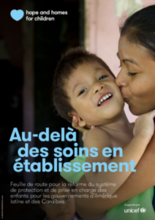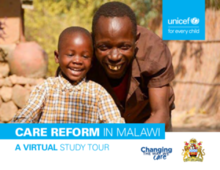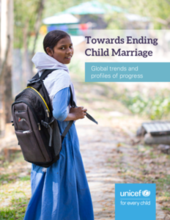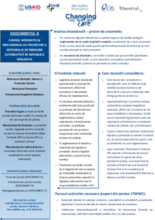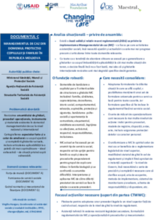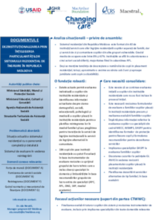Displaying 121 - 130 of 1796
The resource provides information about the care and support of lesbian, gay, bisexual, transgender and questioning children and youth.
Au-delà des soins institutionnels fournit un cadre aux gouvernements pour développer leur propre feuille de route pour la réforme et la désinstitutionnalisation du système de protection et de garde des enfants. Nous espérons qu'il inspirera une conversation, guidera le dialogue interministériel et interprofessionnel, soutiendra les groupes multidisciplinaires à tous les niveaux pour encadrer leur propre évaluation et planifier leur propre feuille de route pour le changement.
This virtual study tour aims to provide you with an overview of care reform in Malawi from the comfort of your own home. Care reform relates to the care of children. It refers to efforts to improve the legal and policy frameworks, structures, services, supports and resources that determine and deliver alternative care, prevent family separation and support families to care for children well.
This video by the Alliance for for Child Protection in Humanitarian Action details
The analysis presented in this report looks at historical trends in child marriage, with a focus on selected countries that have recorded significant declines in child marriage prevalence. It offers an overview of changes in the practice together with a review of other shifts that have occurred in these countries in terms of girls’ access to education and employment opportunities, as well as economic development and poverty reduction.
Cercetarea a vizat o analiză cuprinzătoare a cadrului juridic și de reglementare, conform Orientărilor ONU privind îngrijirea alternativă a copiilor, inclusiv o analiză a mecanismelor de finanțare pentru programarea serviciilor de îngrijire.
În perioada ianuarie-iunie 2021, Changing the Way We Care în Moldova, împreună partenerii săi cheie P4EC, CCF și Keystone Moldova, a efectuat șapte studii de cercetare privind diferite elemente ale sistemului de îngrijire și protecție a copiilor din Moldova, care, atunci când sunt citite împreună, oferă o imagine cuprinzătoare a sistemului.
A fost efectuată atât analiza ghidurilor naționale cât și internaționale, a proceselor standard de operare, a instrumentelor și a materialelor pentru Managementul de caz (MC) pentru a identifica punctele forte și lacunele.
A fost efectuată o evaluare cuprinzătoare a copiilor și adolescenților care trăiesc în îngrijire rezidențială identificând că există un mecanism complex de evaluare, axat pe oferirea unei vederi de 360° asupra nevoilor și interesului superior al copilului.
This study consists of an analysis of government digital policies focused on children in Uruguay between 2009 and 2019. To facilitate this, the CRC was used as a framework to categorise key features of the principal strategies that have been implemented. It argues that while great advances have been made in terms of digital access, this has not been sufficiently accompanied with comprehensive and child-centred solutions that encompass regulations and children and adult digital education.


